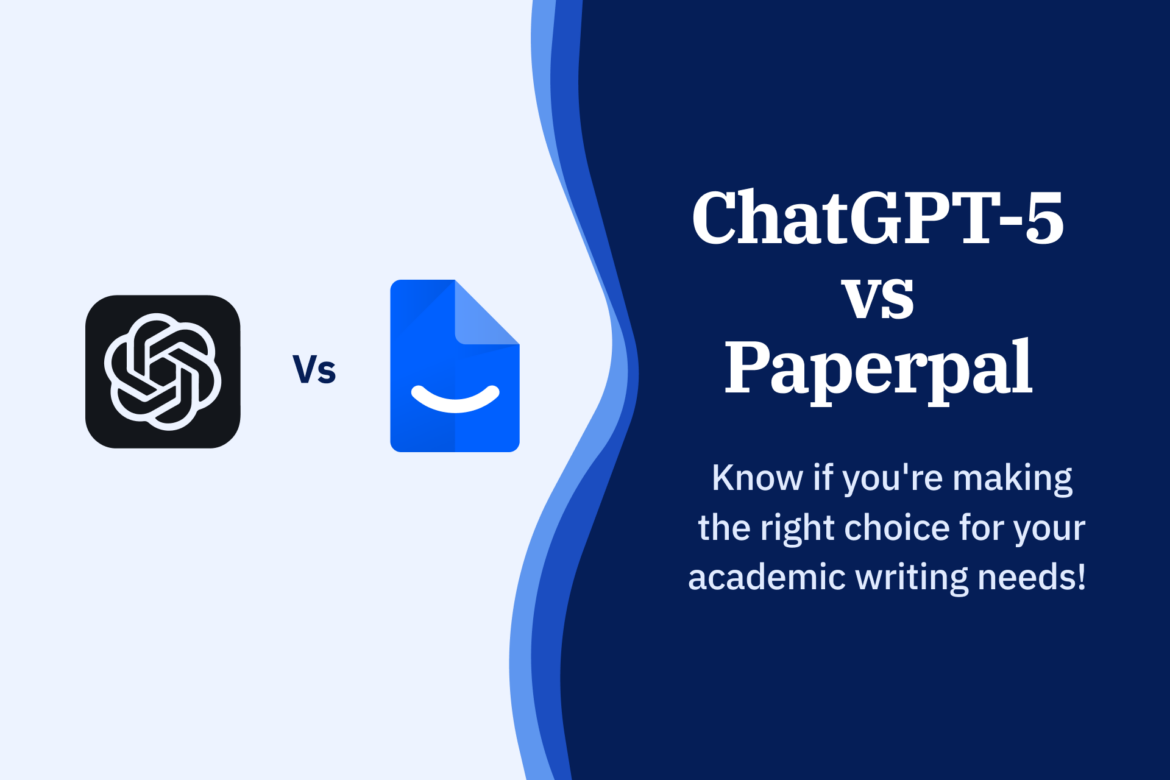Table of Contents
ChatGPT-5 was supposed to be better. Smarter. More helpful. Instead, researchers and students are looking for ChatGPT alternatives for academic writing. Why?
OpenAI built a great Gen AI model, then made it nearly impossible for academics to actually use it. Imagine having a brilliant AI research assistant that suddenly refuses to analyze biological data claiming safety concerns, mixes up citations, and takes forever to respond to your queries. That’s ChatGPT-5 for academia.
It feels like a forced migration from GPT-4o, and students and academics suddenly feel like they’ve been handed a downgrade disguised as progress. This is why the mass shift to ChatGPT alternatives doesn’t feel surprising.
So here we are, doing the homework for you. We compared Paperpal’s AI research assistant with ChatGPT-5 across academic writing tasks, from literature reviews to manuscript editing. In this article, we’ll present a Paperpal vs ChatGPT review that shows you exactly how each tool performs, so you can decide which one deserves a place in your academic toolkit.
TL;DR
- Head-to-head comparison: This review compares ChatGPT-5 against Paperpal, a specialized AI tool preferred by students and academics for academic writing
- ChatGPT-5’s new capabilities: Explores GPT-5’s latest features, including expanded context windows, autonomous research agents, and enhanced research assistance that functions like a real research assistant
- Key limitations identified: ChatGPT-5 faces challenges with discipline-specific terminology, risks of information overload from its broad knowledge base, and time lost in complex prompt engineering to achieve desired outputs
- Performance benchmark: Direct comparison of ChatGPT-5 and Paperpal outputs to determine which AI research assistant delivers more precise results while saving time for students, researchers, and academics
- Best of both worlds: Concludes with strategies for combining GPT-5 and Paperpal to optimize academic writing workflows and maximize time efficiency
GPT-5 vs Paperpal: Quick Comparison
| Features | GPT-5 | Paperpal |
|---|---|---|
| Grammar & Style Corrections | Prompt-based grammar, style, and tone corrections | Real-time corrections for grammar, spelling, punctuation, clarity with word-level personalization. Proactive corrections with no prompts needed. Personal dictionary prevents unwanted changes while maintaining academic tone |
| Word Count Optimization | Shortens via summarization prompts but often loses nuance or key details; often requires multiple iterations | One-click Trim tool condenses text while retaining meaning, key terms, academic terminology, and citations. Optimized for academic conciseness |
| Outline Generation | Open-ended; requires crafted prompts. Users can upload files, but must manage context. Multi-file support provided in the paid version but with messy integration. Outputs can be verbose and misaligned with formats | Curated templates for 10+ article types (including systematic reviews, case reports). Accepts journal guidelines, custom prompts, and reference files for tailored outlines. Auto word-count allocation with context-aware, structured, stepwise guidelines |
| New Text Generation | Produces large chunks of text from prompts; often verbose and risks diluting the author’s voice | Free writing box where users specify what to write; output is structured, concise, and delivered step by step. “Keep writing” feature extends content with built-in prompts (Expand, Argue, Support) for focus and flow. Avoids over-generation, minimizing unnecessary review |
| Chat PDF Note-taking | Can summarize or take notes in chat, but notes are isolated | Supports all document types; provides answers and summaries based on extracted content |
| Citation Search | Searches by DOI or title; can yield irrelevant or misaligned results | Searches by DOI, title, or keywords with results filtered for relevance, minimizing irrelevant results |
| Retracted Paper Detection | No indication of retracted papers | Flags any retracted or withdrawn papers to ensure users avoid citing invalid research |
| Citation Formatting | Requires prompt expertise to format citations and supports only limited citation styles | Comprehensive academic citation engine with 10,000+ citation styles; auto-applies formatting and preserves links for entire reference list |
| AI Review | General feedback and suggestions via prompts; requires iteration and manual assessment | Virtual academic coach with stage-wise review, providing peer-review-style academic feedback |
| Document-Level Technical Checks | General checks via prompts | Provides 30+ key manuscripts and technical language checks to boost publication success |
| Plagiarism Checks | No native checker | Industry-best plagiarism checker for academic writing that scans 99 billion webpages and gives a similarity report |
| AI Use Transparency | Not available | Flags human vs Paperpal AI-written text in real-time (Web editor only); promotes transparency and encourages conscious AI use |
| Translation | Requires extensive prompting to translate academic text, but fails to adhere to technical writing standards | AI-powered translation for 50+ languages with preserved academic tone and terminology for discipline-specific accuracy |
What is ChatGPT-5 and How Does it Differ From ChatGPT-4 and 3.5?
ChatGPT-5 is OpenAI’s latest generative AI model that’s much smarter and faster than older versions like ChatGPT-4 and 3.5. The biggest upgrade in GPT-5 is that it automatically picks the best mode to answer your question – you don’t have to choose between different modes anymore.
Here are a few reasons why ChatGPT-5 caters to scientific writing use cases better than its previous models:
- Expanded Context for Deep Analysis: ChatGPT-5 can process inputs up to 256,000 tokens and handle massive documents. For researchers, this means you can now analyze entire research papers, lengthy literature reviews, or complex datasets in a single interaction without losing context. Students can use GPT-5 to summarize entire textbook chapters or dissertations
- The Autonomous Research Agent: The Research Agent works more like an active participant in your research workflow than a simple text generator. You can use it to perform multi-step tasks such as:
- Conducting literature searches by browsing academic databases
- Running code to analyze data or create visualizations
- Generating documents like presentation slides from a research paper or a spreadsheet from raw data
- Structured Output Generation: GPT-5 has two key features, Free-Form Function Calling and Context-Free Grammar (CFG), which give you complete control over the output. You can ask GPT-5 to generate information in a specific format, such as JSON for data analysis, BibTeX for citations, or a perfectly structured table, minimizing the need for manual reformatting.
- Visual Data Analysis: GPT-5 can understand both text and images. It can analyze charts from a paper, interpret scientific diagrams, or describe the content of historical photographs, adding a rich layer to data interpretation.
- Seamless Integration with Third-Party Apps: GPT-5’s built-in connectors for productivity tools like Gmail and Calendar, plus customizable UI themes, support seamless integration into existing academic workflows.
Where Does ChatGPT-5 Shine as an AI Research Assistant?
When prompted correctly, GPT-5’s strengths can significantly accelerate research and academic writing. Here’s how ChatGPT-5 helps students, researchers, and academics in their academic writing workflow:
- Versatile Knowledge Base: GPT-5 can break down complex concepts from first principles, generate analogies for better understanding, create practice questions for students, and even assist with essential non-academic tasks like drafting grant proposals, CVs, and preparing for conference presentations.
- Effortless Ideation and Brainstorming: Unlike basic ChatGPT-5 alternatives for academic writing, GPT-5 is great for curiosity-driven deep dives, responding well to natural language queries. Whether you’re stuck on how to frame a research question, looking to brainstorm ideas for a thesis presentation or want to break down complex concepts in simple terms, GPT-5 makes exploratory learning quick and accessible.
- Detailed Multifaceted Responses: For any given prompt, GPT-5 can provide multiple perspectives, detailed lines of reasoning, and varied explanations. The rich and detailed responses can serve as starting points for deeper research, fostering a holistic understanding.
Why ChatGPT-5 May Not be the Best AI Tool for Academic Writing?
While its strengths are compelling, researchers and students still seek ChatGPT alternatives like Paperpal, because of the tool’s inherent limitations.
ChatGPT-5 struggles to understand or write in discipline-specific vocabulary
GPT-5 often uses generic or incorrect terminology when handling technical writing. This results in outputs with unclear explanations and misused jargon that don’t meet stringent scientific writing standards.
When given Japanese text to translate to English, here’s how the tool performed compared to Paperpal, the top ChatGPT-5 alternative for academics:
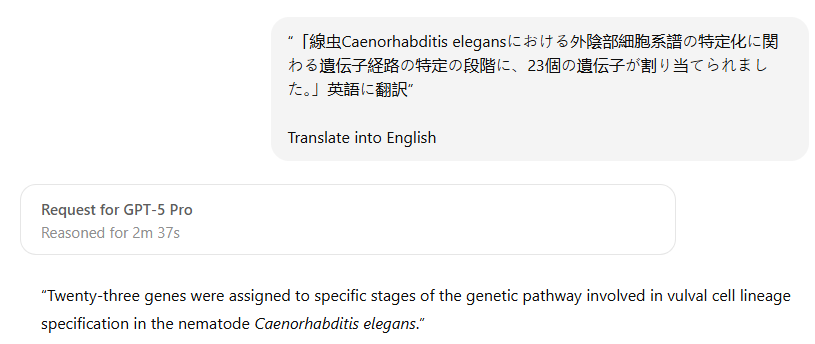
Check out Paperpal’s output.

Risk of information overload
GPT-5’s outputs are incredibly detailed, but it may overwhelm you with verbose, unfocused text, consuming time and deviating from your core research objective. However, specialized ChatGPT alternatives like Paperpal offer structured and data-backed outputs that sharpen your reasoning skills, allowing you to channel your effort into focused, credible outputs that are easier to refine and finalize.
Check out how ChatGPT-5 and Paperpal responded when prompted to give information about current economic crises owing to individual biases among leadership.
Input Prompt: “Write a paragraph on current economic crises owing to individual biases among leadership.”
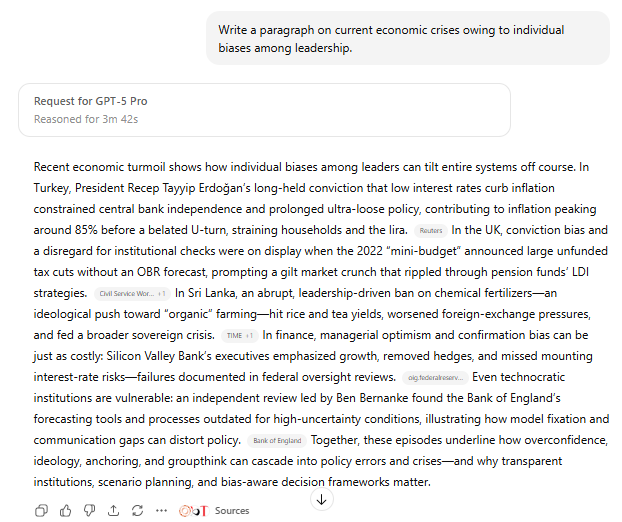
However, specialized ChatGPT alternatives like Paperpal are structured and data-backed, which sharpen reasoning instead of drowning you. You can channel your effort into focused, credible outputs that are easier to finalize without distractions.
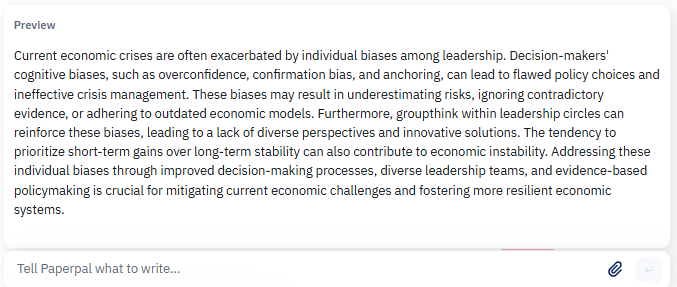
| The Problem with ChatGPT-5 | Why Paperpal Works Better |
| GPT-5 outputs are often long, verbose, and unstructured | Offers concise, well-structured academic content with clear, complete reasoning that builds logically from point to point |
| Outputs look like a wall of text, hard to digest, and harder to use in an academic context | Built-in tools like Keep Writing, Expand, Counterarguments provide structure and help you develop your content, so you achieve your goals faster |
| You need to cut down outputs significantly and reorganize it for better readability, making it counter-productive | The clarity of text outputs sharpens your thinking without burying you in unnecessary details |
Time and effort lost in prompt engineering
Achieving precise, publication-ready outputs requires a lot of back-and-forth prompting on GPT-5. You can save this effort by using guided, domain-specific ChatGPT alternative for academic writing, Paperpal, which understands the academic context and gives you subject-specific suggestions.
We provided a sample text for Paperpal and ChatGPT-5 and asked them to trim it to reduce redundancy. Here’s how both the tools performed
Input Text: “Motivated by the need to highlight the need for employing AI in battling the COVID-19 Crisis, this survey summarizes the current state of AI applications in clinical administrations while battling COVID-19.”
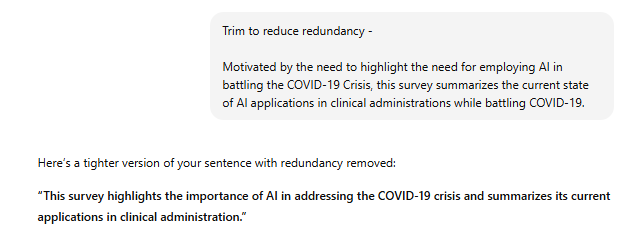
Paperpal’s Trim removed redundant phrasing without losing nuance and preserved terminology and intent.

| The Problem with ChatGPT-5 | Why Paperpal Works Better |
| GPT-5 outputs heavily rely on prompt expertise | Paperpal’s embedded prompts eliminate guesswork; its built-in tools are built to provide reliable results |
| Even tiny changes in your prompt can completely change the output, leading to inconsistencies | One-click writing capabilities give you expertly curated academic corrections, no prompting required |
| GPT-5 often misses the subtle meaning behind your text, leading to endless checks and revisions | Consistent and predictable outputs reduce iterations and speed up revision time |
| GPT-5 may accidentally change your intended meaning or shift the writing tone in ways you didn’t want | Paperpal is solely trained on scholarly text and understands academic context, so there’s no unintended shifts in emphasis |
Hallucinated references with inconsistent formatting
ChatGPT-5 can produce made-up references with incorrect formatting, forcing you to fact-check each citation.
Input Prompt: Add supporting citations for: AI in healthcare improves diagnosis and treatment.
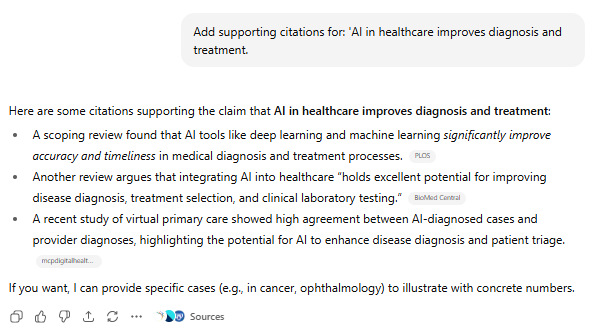
ChatGPT-5 produces made-up references with incorrect formatting, forcing you to fact-check each citation.
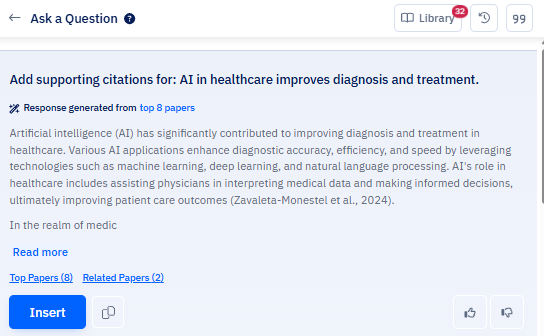
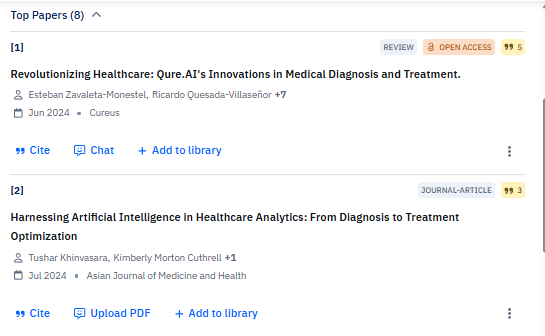
Paperpal, the best ChatGPT alternative for academic writing, provides verified, context-relevant references in the correct formatting across 10,000+ styles. Moreover, Paperpal hosts a growing repository of 250Mn+ research articles where retracted/withdrawn papers are clearly flagged, further safeguarding academic integrity.
Restricted usage on Free and Plus plans
ChatGPT-5’s usage is restricted to 10 messages/5 hours for free users and 160 messages/5 hours for Plus users. The usage limits may vary depending on server load and can be lower for complex research queries, leading to unexpected interruptions that can hinder productivity and break the momentum required for deep, focused research.
However, Paperpal Prime gives you unlimited access to write, edit, research, cite, and finalize your drafts—all in one platform.
Paperpal AI Research Assistant: The Best ChatGPT-5 Alternative for Research and Academic Writing
Paperpal, a comprehensive AI research and writing assistant, is now the preferred free alternative to ChatGPT-5 for more than 3Mn+ academics. Trained on millions of scholarly articles and leveraging over 23 years of STM expertise, Paperpal understands and preserves academic context. This ensures that its language suggestions, AI-generated text, and in-depth submission checks not only help you achieve high-quality content but also align your work with stringent academic writing conventions.
As the best free ChatGPT-5 alternative, Paperpal’s end-to-end toolkit provides you with:
- In-depth Language Checks: Tailored to enhance academic text, Paperpal provides context-aware language suggestions a month, while retaining domain-specific phrasing, non-English words, and specific terms added to your personal dictionary.
- Reference Finder: Paperpal lets you search for references by title, DOI, or keyword; users can also ask the AI questions and get accurate, fact-based responses linked to relevant references from 250Mn+ verified research articles.
- Citation Generator: Users can select text and get citation recommendations and instantly insert accurately formatted citations and references in their writing with a few clicks. Supports APA, MLA, IEEE, Chicago, and 10,000+ other citation styles.
- Chat with PDF: Paperpal Chat with PDF saves hours by enabling users to dive into research and make literature reviews more effective. Upload any PDF and Paperpal can instantly analyze the full text, summarize it, and extract insights in minutes. You can also start drafting your notes directly in a Paperpal document, with the option to expand them into full text later.
- Structured Outlines: Paperpal provides structured outlines for 10+ article types (e.g., systematic review, case report), even tailoring them to journal guidelines or other uploaded references. It can also generate titles, abstracts, summaries, study highlights, and journal communication emails based on your inputs.
- Writing Suggestions: Users can tell Paperpal what to write or choose from its pre-set prompts (e.g., Expand, Argue, Support) to generate contextual text suggestions tailored for academic use. It also allows you to upload rough notes, institutional guidelines, and other reference documents to provide more precise writing outputs, minimizing the need for repeated follow-ups or in-depth review.
- AI Paraphraser: Paperpal Rewrite offers 10+ paraphrasing options that help you reword text in 50+ languages, without altering the original context, meaning, and citations. Choose to paraphrase for clarity and fluency, reduce word counts, achieve an academic tone or adjust tones to suit your intended audience.
- Academic Translation: Users can also get academically accurate translations across 50+ languages, all without losing out on context or meaning.
- Plagiarism Checker: Paperpal’s plagiarism checker scans up to 7,000 words a month for free, helping you avoid accidental plagiarism by comparing your work to 99Bn+ webpages, including 200Mn+ open access articles. Prime users can scan up to 10,000 words a month, with the option to buy up to 50,000 words more if needed.
- AI Review: Instant peer-review-style evaluation and practical feedback on your draft to address gaps and improve logical flow and readability before submission.
- Journal Submission Checks: Provides 30+ language and technical compliance pre-submission checks to boost your manuscript’s chance of acceptance.
- Tools for Responsible Use: To ensure transparency and authenticity, Paperpal also provides tools that track the use of AI in your writing and templates to help you disclose its use in your final submissions.
Try Paperpal, the best ChatGPT-5 alternative for free, and get an all-in-one academic writing toolkit to excel in academia. Sign up for free!
Final Verdict: Paperpal is the Best ChatGPT Alternative for Academics
When your priority is getting consistent results with academic precision and a streamlined workflow without extensive prompting, Paperpal is clearly the best ChatGPT-5 alternative for academic writing. Whether you’re working on the Web, MS Word, Google Docs, or Overleaf, Paperpal emerges as the perfect tool with end-to-end research and writing support.
Instead of relying on ChatGPT, use Paperpal for:
- Editing and revision – Perfect when you need precise grammar, style, and clarity corrections tailored for academic text, without trial-and-error prompting
- Structuring content – Create outlines with step-by-step guidance for 10+ article formats (e.g., systematic reviews, case reports, etc.), with proper academic structure and terminology
- Writing with contextual suggestions – Upload notes or institutional guidelines and get context-aware suggestions to develop your content in minutes. Select text and expand on, paraphrase, reduce text, translate, change tones and more with just a click – no extra prompting needed
- Finding relevant literature – When you need credible sources to strengthen your writing, check for retracted or withdrawn papers, and get summarized answers from published literature – all drawn from a growing repository of 250Mn+ verified research articles
- Citation management – When you want citation recommendations with the option to cite sources directly in your document with a click; Paperpal generates accurate citations in 10,000+ styles
- Manuscript preparation – For peer-review-style feedback and comprehensive document-level journal submission checks to minimize desk rejection risk
- Translation work – When you need to translate academic content accurately, while preserving discipline-specific terminology
- Maintaining academic integrity – For best-in-class plagiarism checks, tracking AI usage, and disclosure templates aligned to publisher requirements to maintain originality and transparency in your work
Try Paperpal, the best ChatGPT-5 alternative for free, and level up with the all-in-one research and writing toolkit for academics. Sign up now for free!
Frequently Asked Questions
ChatGPT-5 presents mixed safety considerations for academic writing. While it doesn’t pose direct security threats, it carries significant academic integrity risks that make it potentially unsafe for serious scholarly work.
Our detailed ChatGPT-5 review highlights that it can generate fake or unverifiable citations, often producing hallucinated references with incorrect DOIs or missing journal information. This forces users to manually cross-check every citation, creating substantial risk of academic misconduct if overlooked.
ChatGPT-5 also lacks built-in plagiarism detection and has no mechanism to flag retracted papers, meaning users could unknowingly cite invalid research. The tool also tends to slip into imprecise or generic terminology when handling technical writing, potentially leading to scientifically misleading content.
ChatGPT-5 has limited value as a primary research source, though it can serve specific exploratory functions. While ChatGPT-5 provides information based on its training data, it may suggest references that are not fully verified. When web search is enabled, it may include unverified or non-academic sources. This makes it unreliable for rigorous research needs.
However, it excels in the early stages of research for concept exploration, understanding complex topics through analogies and examples, and conducting “teach me like I’m 10” style learning sessions. The tool’s strength lies in breadth and flexibility for exploratory learning and brainstorming, but it requires careful fact-checking and verification of all information before use in academic contexts.


